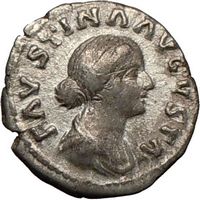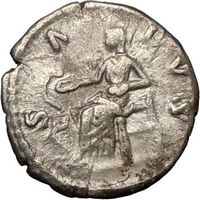Faustina II Roman Empress Marcus Aurelius wife Commodus mother Ancient
Coins Investment
Buy coins of
Faustina II Roman Empress
Faustina, named after her mother, was her parents'
fourth and youngest child and their second daughter; she was also their
only child to survive to adulthood. She was born and raised in
Rome.
Every coin comes with it's own custom-made, unique certificate of
authenticity $50-$100 value, absolutely free, a lifetime guarantee of
authenticity, professional research photograph and history.
You can also watch the video below for more in-deph information.


Example of Authentic Ancient
Coin of:
Faustina II - Roman Empress & Wife of Emperor
Marcus Aurelius - 161-175 A.D. -
Silver Denarius 18mm (2.84 grams) Struck circa 161-175 A.D.
Reference: RIC 714 (Marcus Aurelius), C 195
FAVSTINAAVGVSTA - Diademed, draped bust right.
SALVS - Salus seated left, feeding snake on altar.
Salus (Health) a Goddess of the Romans, the same that was worshipped
under the name of Hygiea by the Greeks, who feigned her to be the
daughter of Asclepius and of Minerva. On a denarius of the Acilia family
appears the head of the goddess and on the reverse a female standing
with a serpent in her hand. The types of this divinity on imperial coins
most frequently present to view a woman clothed in the stola;
 sometimes
she is sitting, at others standing; in others in a recumbent posture,
with a serpent either on her right or her left arm in a quiescent state,
rising in folds or entwined round an altar before her, and receiving
food from a patera, which she holds in her extended hand. It is in this
form (which was doubtless that of her statues and with these symbols)
that she is exhibited on most coins on the imperial series from Galba to
Maximianus. She had a celebrated temple at Rome, painted, it was said,
by Q. Fabius, who thence was surnamed Pictor (the painter) . - There
appears to be some affinity between this personification of Salus, when
offering food in a patella to a serpent, and the Lanuvian virgin
represented in the same act on coins bearing the head of Juno Sospita. -
The opinion also has the probability on the face of it, which refers the
serpent on coins, where mention is made of Salus Augusti, or Augustorum,
to Aesculapius and his daughter Hygaeia (or Salus) as deities of Health.
- Certain it is that when those sanitary divinities, and especially when
Dea Salus, occur on coins of Emperors, they indicate that those princes
were labouring at the time under some diseases; on which account, it
would seem, sacred rites had been performed for them and the memorial of
the event recorded on public monuments. sometimes
she is sitting, at others standing; in others in a recumbent posture,
with a serpent either on her right or her left arm in a quiescent state,
rising in folds or entwined round an altar before her, and receiving
food from a patera, which she holds in her extended hand. It is in this
form (which was doubtless that of her statues and with these symbols)
that she is exhibited on most coins on the imperial series from Galba to
Maximianus. She had a celebrated temple at Rome, painted, it was said,
by Q. Fabius, who thence was surnamed Pictor (the painter) . - There
appears to be some affinity between this personification of Salus, when
offering food in a patella to a serpent, and the Lanuvian virgin
represented in the same act on coins bearing the head of Juno Sospita. -
The opinion also has the probability on the face of it, which refers the
serpent on coins, where mention is made of Salus Augusti, or Augustorum,
to Aesculapius and his daughter Hygaeia (or Salus) as deities of Health.
- Certain it is that when those sanitary divinities, and especially when
Dea Salus, occur on coins of Emperors, they indicate that those princes
were labouring at the time under some diseases; on which account, it
would seem, sacred rites had been performed for them and the memorial of
the event recorded on public monuments.
Annia Galeria Faustina Minor (Minor
Latin for the younger), Faustina Minor or Faustina the
Younger
 (February
16 between 125 and 130-175) was a daughter of
Roman Emperor
Antoninus Pius and Roman Empress
Faustina the Elder. She was a Roman
Empress and wife to her maternal cousin Roman Emperor
Marcus Aurelius. Though Roman sources
give a generally negative view of her character, she was held in high
esteem by soldiers and her own husband and was given divine honours
after her death. (February
16 between 125 and 130-175) was a daughter of
Roman Emperor
Antoninus Pius and Roman Empress
Faustina the Elder. She was a Roman
Empress and wife to her maternal cousin Roman Emperor
Marcus Aurelius. Though Roman sources
give a generally negative view of her character, she was held in high
esteem by soldiers and her own husband and was given divine honours
after her death.
Biography
Faustina, named after her mother, was her parents'
fourth and youngest child and their second daughter; she was also their
only child to survive to adulthood. She was born and raised in
Rome.
Her great uncle, the Emperor
Hadrian, had arranged with her father
for Faustina to marry
Lucius Verus. On February 25, 138, she
and Verus were betrothed.
Verus’ father was Hadrian’s first
adopted son and his intended heir. However when Verus’ father died,
Hadrian chose Faustina’s father to be his second adopted son, and
eventually, he became Hadrian’s successor. Faustina’s father ended the
engagement between his daughter and Verus and arranged for Faustina's
betrothal to her maternal cousin,
Marcus Aurelius; Aurelius was also
adopted by her father. On May 13, 145, Faustina and Marcus Aurelius were
married. When her father died on March 7, 161, her husband and Lucius
Verus succeeded to her father’s throne and became co-rulers. Faustina
was given the title of
Augusta and became Empress.
Unfortunately, not much has survived from the Roman
sources regarding Faustina's life, but what is available does not give a
good report.
Cassius Dio and the
Augustan History accuse Faustina of
ordering deaths by poison and execution; she has also been accused of
instigating the revolt of
Avidius Cassius against her husband.
The Augustan History mentions adultery with sailors, gladiators,
and men of rank. However, Faustina and Aurelius seem to have been very
close and mutually devoted. Her husband trusted her and defended her
vigorously against detractors.
Faustina accompanied her husband on various military
campaigns and enjoyed the love and reverence of Roman soldiers. Aurelius
gave her the title of Mater Castrorum or Mother of the Camp.
Between 170-174, she was in the north, and in 175, she accompanied
Aurelius to the east. However, these experiences took their toll on
Faustina, who died in the winter of 175, after an accident, at the
military camp in Halala (a city in the
Taurus Mountains in
Cappadocia).
Aurelius grieved much for his wife and buried her in
the Mausoleum of Hadrian in Rome. She was deified: her statue was placed
in the Temple of Venus in Rome and a temple was dedicated to her in her
honor. Halala’s name was changed to Faustinopolis and Aurelius
opened charity schools for orphan girls called Puellae Faustinianae
or 'Girls of Faustina'. The Baths of Faustina in
Miletus are named after her.
In their thirty years of marriage, Faustina bore
Marcus Aurelius thirteen children:
-
Annia Aurelia Galeria Faustina
(147-after 165)
-
Gemellus Lucillae (died around 150), twin brother
of Lucilla
-
Annia Aurelia Galeria
Lucilla (148/50-182), twin sister
of Gemellus, married her father's co-ruler
Lucius Verus
-
Titus Aelius Antoninus (born after 150, died
before 7 March 161)
-
Titus Aelius Aurelius (born after 150, died
before 7 March 161)
-
Hadrianus (152-157)
-
Domitia Faustina (born after 150, died before 7
March 161)
-
Fadilla (159-after 211)
-
Annia Cornificia Faustina Minor
(160-after 211)
-
Titus Aurelius Fulvus Antoninus (161-165), twin
brother of Commodus
-
Commodus (161-192), twin brother of
Titus Aurelius Fulvus Antoninus, later emperor
-
Marcus Annius Verus Caesar
(162-169)
- Vibia Aurelia Sabina (170-died before 217)
|